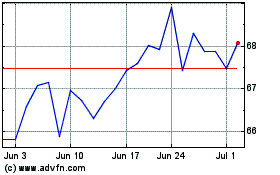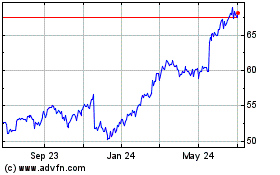Today's Top Supply Chain and Logistics News From WSJ
March 13 2018 - 6:51AM
Dow Jones News
By Paul Page
Sign up: With one click, get this newsletter delivered to your
inbox.
While venture capitalists and tech gurus are fretting over
cryptocurrencies, the future of the underlying blockchain
technology may be in the warehouse. Nitty-gritty research on the
technology is underway in logistics, far from hype that surrounds
cryptocurrencies like bitcoin, and the WSJ's Christopher Mims
writes the behind-the-scenes efforts may bring much-needed change
to some of the world's most critical, if unsexy, industries.
Already, 1.1 million items on sale at Walmart Inc. are on a
blockchain, helping the company trace their journey from
manufacturer to store shelf. Maersk Line uses the same technology
from IBM to track shipping containers, making it faster and easier
to get them through customs and transfer them from one
freight-handler to the next. Blockchain is gaining traction in
logistics because it's well-suited to transactions that require
trust and a permanent record and involve many different parties.
And critically, the technology has buzz that attracts developers
and investment, providing a new jolt to operations that have made
only small progress in technology in recent years.
The push toward electric vehicles is triggering a sharp turn in
traditional automotive supply chains. Ohio-based auto parts
supplier Dana Inc. is bidding for control of GKN PLC's axle
business in a deal valued at $6.1 billion, the WSJ's Chester Dawson
reports, stepping into a nasty battle for the British parts maker
that highlights the urgency of changing auto manufacturing
strategies. The move, which would create the world's largest
supplier of driveline components, is designed to improve Dana's
position in electric-vehicle production. The battle over GKN may
reverberate across truck plants since GKN's customer list includes
truck makers Paccar Inc. and Volvo AB. It's part of a broader
restructuring of the automotive supplier market as technology
companies rush in with new autonomous-vehicle strategies and
traditional suppliers like Dana jockey for a place in a changing
business. Just this month, Japanese auto parts supplier Denso, an
affiliate of Toyota Motor Corp., acquired a 4.5% stake in chipmaker
Renesas Electronics.
The world's biggest mining companies are growing more concerned
about costs even as they count up big profits. Barely into a
commodities rebound, the sector faces a fresh cost crunch as
production and transportation prices begin to climb, the WSJ's
Rhiannon Hoyle reports, placing new pressure on suppliers including
the dry-bulk carriers that are still trying to climb out of the
financial hole created by the long commodities downturn. Companies
including Rio Tinto and Glencore PLC have focused heavily on
reining back operating costs in recent years, introducing drones
and driverless trucks meant to keep labor costs down. New stresses
are spreading from production to distribution. Workers are
demanding higher wages in countries like Chile, where truck drivers
argue better copper prices should translate to better pay. And the
Baltic Dry Index measure of shipping prices has been tracking lower
this year after rebounding late last year, suggesting shipping
customers may be pushing back harder against rate increases.
ECONOMY & TRADE
Automobile trade is providing the latest battleground over U.S.
tariffs. President Donald Trump is lashing back at European
criticism of his planned steel and aluminum tariffs with
suggestions that the U.S. might put new levies on European cars,
the WSJ's Andrea Thomas, Paul Vieira and David Winning report,
putting countries such as Germany high on the list of possible
targets in a potential trade war. The EU imposes a 10% duty on cars
imported from the U.S. and some other countries, while the U.S.
duty on cars imported from the EU is 2.5%, under global trade rules
set in 1994. Meantime, American steel maker Nucor Corp., which has
applauded the tariffs, says it will build a $240 million steel mill
in Florida, the company's latest effort to capitalize on a rising
market for the metal. The plant will produce reinforcing steel bars
used in construction, and Nucor says it will have an advantage over
competitors who ship rebar long distances.
QUOTABLE
IN OTHER NEWS
The OECD projects an improving global economy this year if trade
tensions don't undercut expansion. (WSJ)
President Trump blocked Broadcom Ltd.'s hostile bid for Qualcomm
Inc. over national security concerns. (WSJ)
Johnson Controls International PLC could sell or spin off its
battery business as part of the industrial company's plan to
strengthen its core building technology offerings. (WSJ)
More than 45 people were killed when a plane crash-landed and
caught fire at Nepal's Kathmandu Airport. (WSJ)
Amazon.com is launching sales in Vietnam, in a challenge to
Alibaba Group Holding Ltd. in one of the fastest-growing e-tailing
markets in the world. (Nikkei Asian Review)
Pakistani textile manufacturers are spending $7 billion to
establish an additional 1,000 garment plants. (Sourcing
Journal)
Kohl's Corp. says it filled 36% of its online orders through
store pickups in the fourth quarter. (Supply Chain Dive)
Amazon.com took on about $22 billion in purchase obligations
from food suppliers when it bought Whole Foods last year.
(CNBC)
A survey shows more than a third of industrial distributors
don't offer e-commerce options for buyers. (Industrial
Distribution)
Ship broker Clarkson saw a 12% gain in pre-tax profit in 2017 on
a 6% revenue gain in a recovering shipping market. (Financial
Times)
The Suez Canal Authority is cutting rates for some bulk carriers
in a push to win vessels carrying coal from U.S. suppliers to
India. (Lloyd's List)
A freight rail capacity shortage is undermining attempts by
Ukraine's grain producers to expand exports. (Bloomberg)
Maersk Line sister company APM Terminals is investing in greater
landside logistics to attract logistics and freight companies.
(Port Technology)
Fourth-quarter revenues at Canada's Cargojet jumped 25.6%. (Air
Cargo News)
ABOUT US
Paul Page is deputy editor of WSJ Logistics Report. Follow him
at @PaulPage, and follow the WSJ Logistics Report team:
@jensmithWSJ and @EEPhillips_WSJ. Follow the WSJ Logistics Report
on Twitter at @WSJLogistics.
Write to Paul Page at paul.page@wsj.com
(END) Dow Jones Newswires
March 13, 2018 06:36 ET (10:36 GMT)
Copyright (c) 2018 Dow Jones & Company, Inc.
Walmart (NYSE:WMT)
Historical Stock Chart
From Mar 2024 to Apr 2024

Walmart (NYSE:WMT)
Historical Stock Chart
From Apr 2023 to Apr 2024
